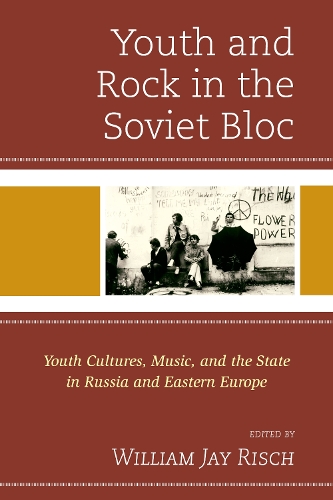
Youth and Rock in the Soviet Bloc: Youth Cultures, Music, and the State in Russia and Eastern Europe
(Hardback)
Available Formats
Publishing Details
Youth and Rock in the Soviet Bloc: Youth Cultures, Music, and the State in Russia and Eastern Europe
By (Author) William Jay Risch
Contributions by Jonathyne Briggs
Contributions by Kate Gerrard
Contributions by Sandor Horvath
Contributions by Tom Junes
Contributions by Gregory Kveberg
Contributions by Polly McMichael
Contributions by David Tompkins
Contributions by Gleb Tsipursky
Contributions by Dean Vuletic
Bloomsbury Publishing PLC
Lexington Books
17th December 2014
United States
Classifications
Professional and Scholarly
Non Fiction
Popular culture
Globalization
306.0947
Physical Properties
Hardback
318
Width 160mm, Height 243mm, Spine 26mm
599g
Description
Youth and Rock in the Soviet Bloc explores the rise of youth as consumers of popular culture and the globalization of popular music in Russia and Eastern Europe. This collection of essays challenges assumptions that Communist leaders and Western-influenced youth cultures were inimically hostile to one another. While initially banning Western cultural trends like jazz and rock-and-roll, Communist leaders accommodated elements of rock and pop music to develop their own socialist popular music. They promoted organized forms of leisure to turn young people away from excesses of style perceived to be Western. Popular song and officially sponsored rock and pop bands formed a socialist beat that young people listened and danced to. Young people attracted to the music and subcultures of the capitalist West still shared the values and behaviors of their peers in Communist youth organizations. Despite problems providing youth with consumer goods, leaders of Soviet bloc states fostered a socialist alternative to the modernity the capitalist West promised. Underground rock musicians thus shared assumptions about culture that Communist leaders had instilled. Still, competing with influences from the capitalist West had its limits. State-sponsored rock festivals and rock bands encouraged a spirit of rebellion among young people. Official perceptions of what constituted culture limited options for accommodating rock and pop music and Western youth cultures. Youth countercultures that originated in the capitalist West, like hippies and punks, challenged the legitimacy of Communist youth organizations and their sponsors. Government media and police organs wound up creating oppositional identities among youth gangs. Failing to provide enough Western cultural goods to provincial cities helped fuel resentment over the Soviet Unions capital, Moscow, and encourage support for breakaway nationalist movements that led to the Soviet Unions collapse in 1991. Despite the Cold War, in both the Soviet bloc and in the capitalist West, political elites responded to perceived threats posed by youth cultures and music in similar manners. Young people participated in a global youth culture while expressing their own local views of the world.
Reviews
Risch and his collaborators demonstrate . . . [that] this music and its complex subcultures mattered deeply across Eastern Europe. They are giving it the renewed attention it deserves. * The Russian Review *
This is the first serious attempt to bring scholarly work on music and youth (sub)cultures in the Eastern Bloc together in a comparative fashion. It provides an excellent entry to the topic for non-experts. The volume is an interesting and innovative contribution to an emerging and developing debate. -- Mark Fenemore, Manchester Metropolitan University
This is a well-written, engaging and exceedingly informative collection of articles telling us how late socialist states related to rock music and the youth, who listened to it. Even better, many articles also tell us how late socialist youth related to the Western or Western-inspired music they loved and to the political regimes, which felt so ambivalent about it. The result is a mosaic of solidly researched pieces that manages to side-step easy binaries of opposition and conformity and highlight the many different layers of in-betweenbetween private and public, between East and West, between freedom and repressionthat characterized how youth cultural agents and the socialist states interacted with each other. -- Juliane Frst, University of Bristol
Author Bio
William Jay Risch is associate professor of history at Georgia College.
